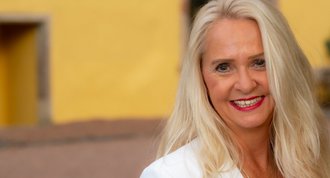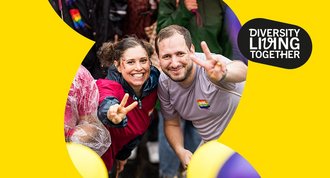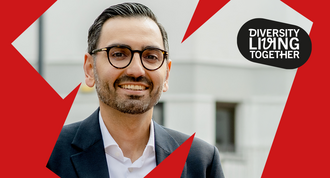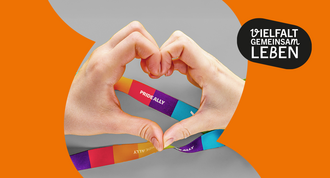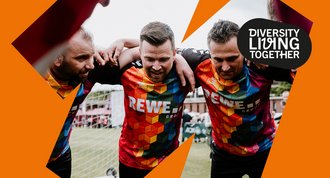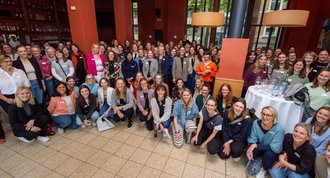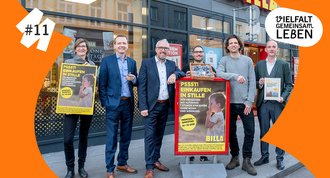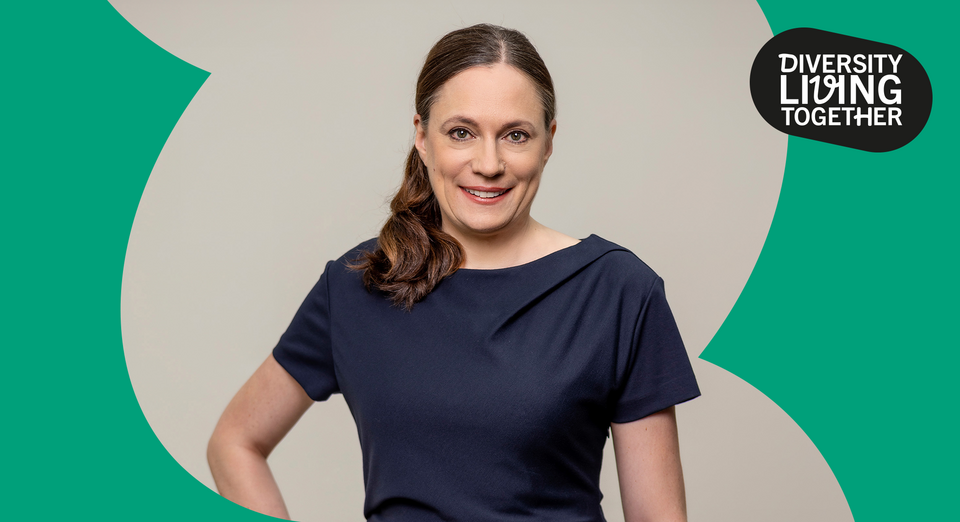
Why should companies make a strong commitment to diversity and an open society right now? And why is diversity no longer a nice-to-have, but a decisive factor for corporate success? Current studies show: European companies with diverse management teams are over 60 per cent more likely to be more profitable than average. The greater the diversity in management teams, the better the companies perform in the evaluation of their corporate strategy and in the indicators for attracting and retaining talent (see McKinsey Study 2024). What does this mean in concrete terms and how do we live diversity at REWE Group? Daniela Büchel, member of the Management Board responsible for HR and Sustainability, explains in an interview.

one: In the USA, there are currently voices calling for more male influence in business and criticising quotas for women and diversity initiatives. Many companies are already scaling back their initiatives. What is your view of this development?
Daniela Büchel: I am watching this development with concern and personally consider it dangerous and backward-looking. What's more, the momentum that is currently developing in the USA has the potential to spread to other countries. It is therefore more important than ever to take a clear stance in favour of diversity and equality and to actively campaign for them. Regardless of its ethical and moral significance, diversity is a decisive competitive factor. At REWE Group, we are so successful not despite, but because of our great diversity. The Management Board of REWE Group and hopefully our entire workforce believe in this very strongly.
one: To what extent do we benefit from diversity at REWE Group?
Daniela Büchel: We operate in a highly competitive market and have to address a diverse customer base. In order to really understand their needs and be close to them, we need teams that bring a wide range of experience and perspectives to the table. This not only enables us to develop creative and innovative solutions, but also helps us to react flexibly to changes - something that is urgently needed nowadays. What's more, in times of labour shortages and demographic change, we cannot avoid seeing diversity as an opportunity. Without the labour force of women, older people or people with a history of migration, we would only be able to draw on a fraction of the available workforce. To pick up on my thought from a moment ago: Apart from the fact that we must fundamentally ask ourselves how we want to shape our coexistence as a society, companies should always additionally consider the economic significance of promoting diversity alone. To summarise: Without diversity, there is no business.
one: That sounds as if diversity happens by itself anyway - so why do we need measures for more diversity and equal opportunities at all?
Daniela Büchel: Because diversity alone won't get us anywhere. It's all about the inclusion of different employees; we need a culture in which different approaches are seen as an opportunity. Ultimately, we all need diversity skills - in other words, the ability to consciously recognise the differences between people and to value and support them in their diversity. Genuine diversity also requires very specific framework conditions that make it possible in the first place - for example, in terms of compatibility.
one: Could you explain that in a little more detail?
Daniela Büchel: Two questions are crucial for me. The first: How can we future-proof our company? This is the economic factor; we have to do everything we can to ensure that demographic developments don't fall on our shoulders tomorrow and cause us to lose colleagues. In other words, we need to bring top-qualified colleagues into management positions, enable work-life balance, encourage labour migration and promote lateral hires. The second question: What kind of world do we want to live in? As a company, we are part of society and have a responsibility. Personally, I want to live in a tolerant, inclusive world in which diversity is valued. That's what we want to stand for in our company.
one: Where do we currently stand?
Daniela Büchel: We have been working intensively on the topic of work-life balance for many years and were the first food retailer in Germany to pass the diversity add-on in the new re-certification cycle of the "job and family" audit. The prerequisite for this is that diversity and inclusion programmes are defined to ensure that everyone is given the same opportunities, regardless of age, gender, gender identity, origin, religion/belief, ethnic or social background, sexual orientation or disability.
„At REWE Group, we are so successful not despite, but because of our great diversity. The Management Board of REWE Group and hopefully our entire workforce firmly believe in this.“ Daniela Büchel
one: What has happened in other areas?
Daniela Büchel: Our LGBTIQ+ network DITO now has around 500 members and various local groups representing the LGBTIQ+ community in the company. We have also been a sponsor of various CSDs in Germany, Austria and Italy for many years and set an example for diversity with rainbow flags in front of and stickers on our stores and travel agencies throughout Germany. We promote the integration of culturally diverse backgrounds by actively recruiting young refugees for internships and apprenticeships as part of the KIMAT initiative. As part of the "Ehrensache" or "Joblinge" projects, many colleagues act as mentors to help socially disadvantaged young people find an internship, apprenticeship or job. We recently launched the internal "Diversity Network" to anchor diversity in the company across all Business Areas.
one: We also set ourselves measurable goals - for example, to achieve gender parity at management level by 2025. However, things are still looking bleak, especially at the top management levels. What is the reason for this?
Daniela Büchel: At management levels one and two, i.e. the Management Board and senior executives with a total of just under 250 colleagues, the proportion of women is actually less than 15 per cent. There is no simple answer as to why this is the case. We are trying to make several adjustments - from mentoring programmes such as Women's Drive to networks such as f.ernetzt. We are also seeing success across all management levels, where we have a 45.5 per cent share of women. However, as we also want to fill our management positions at top level from within our own ranks wherever possible, this is not happening as quickly as we would like. Our senior managers play a very central role here, and this is also where we start.
one: In what way?
Daniela Büchel: Because equality starts in the minds of those who have influence - on who is hired, promoted and promoted. We need more mentors like my fellow board member Peter Maly, for example, who is very keen to promote women in management and at sales department level. My appeal to all senior managers: promote female talent! Stand up for women - including career changers - in whom you see potential. Encourage them, support them and find solutions together, for example when it comes to flexible working models.
one: Does equality fail mainly because of the issue of compatibility?
Daniela Büchel: Not only, but this is a major issue that we need to solve for society as a whole. The fact is that women still do most of the care work. If a man takes over child rearing, there are often comments to that effect. We have therefore done a lot in recent years to promote work-life balance. Of course, this is easier in the head offices than in the stores. For example, we offer top positions on a part-time and job-sharing basis. For around five years now, it has also been possible to work part-time as a store manager - we are the only retailer to do so.
one: How well is this option accepted?
Daniela Büchel: At executive level, it has so far only been women who have taken advantage of the job-sharing or part-time option. We still need to dispel the myths and barriers in people's minds so that this is utilised more at all levels and also by men. The part-time store manager model is well received in regions where there is more visibility and best practice, such as REWE Süd.
„We all need diversity competence - in other words, the ability to consciously recognise the differences between people and to appreciate and support them in their diversity.“ Daniela Büchel
one: Diversity goes far beyond the advancement of women. What are we doing to promote inclusion, for example?
Daniela Büchel: Inclusion is important to us and we have not yet fully exploited the potential of the inclusive labour market. One example of successful inclusion work can be seen at REWE West, where over 90 people with disabilities were hired last year alone. REWE salesman David Hegemann from Düsseldorf accompanies the first trainee in a wheelchair on his way to becoming a salesman. Salesman Dietmar Tönnies from Odenthal has a deaf colleague in his team - and there are many other positive examples. We have also been working towards greater inclusion since 2017 with a strategic cooperation between the REWE Group and Aktion Mensch as well as a cooperation between toom and Lebenshilfe. We are also involved in myAbility, where we offer a coaching and training programme to Master's students with a disability or chronic illness. We will continue to promote an inclusive working environment and society.
one: What have you learnt about inclusion?
Daniela Büchel: Our experience shows that it can be challenging to have just one person with a disability in the team. From the perspective of community and mutual support, it makes more sense to include several people per team. This is why our colleagues at BILLA in Austria, for example, are focussing particularly on larger stores. However, we have also learnt that barriers start in the mind. If the culture is right and teams are open to each other, solutions can almost always be found.
one: What are the biggest challenges?
Daniela Büchel: There is an incredible administrative burden. To avoid placing too much of a burden on the stores, Roderich Dörner, who is responsible for inclusion in the HR department, provides support at REWE West. The retailers have had a very positive experience, both in human terms and economically, as they receive financial support. We have planned a workshop to see how we can roll out the concept nationally. There is already a list of many retailers who would like to take part. Customers have also reported that they experience a really great atmosphere in the store when inclusion is practised there. It is important to always employ people where their strengths lie. Strength-based management is an important part of our management programmes.
one: Where are the biggest to-dos when it comes to diversity?
Daniela Büchel: In the IT sector, which is still male-dominated, it is still difficult to form gender-diverse teams and, above all, to have more women in management positions. The sales department is also traditionally quite male-dominated, but we now also have examples of female sales managers such as Elisabeth Promberger at REWE Süd.
And there are diversity dimensions that will become even more important in the future, such as age diversity. 44 per cent of the population in Germany is over 50 years old. As job-related knowledge becomes obsolete at ever shorter intervals, often within a few years, it is crucial to utilise the benefits of intergenerational diversity. I believe that when it comes to diversity, the journey really is the destination, and it's really important that we take it together.



